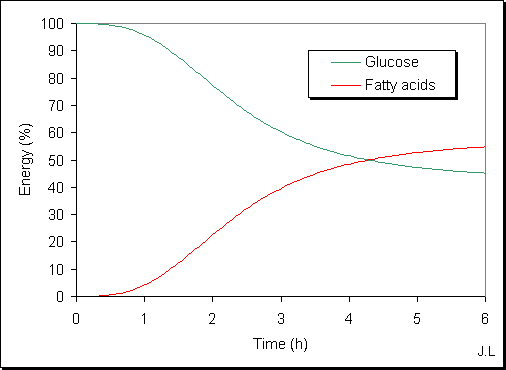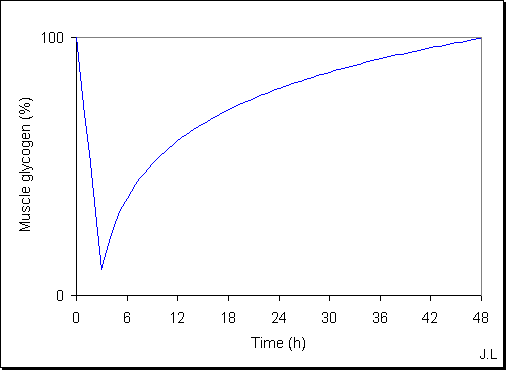
Aerobic metabolism
The biochemical process of aerobic source consists in transforming glucids (carbohydrates), lipids (fats) and possibly protids (proteins), with the oxygen of the air, into mitochondrias (Krebs cycle). It produces H2O and CO2 and is named cellular respiration. This process is limited by the glucid and water reserves and by thermic regulation.
Glucids
They are into pasta, rice, bread, sugared foods, etc. Glucids are transformed into glucose and glycogen. Glycogen is a polymer of glucose allowing storage into muscles and liver, glucose only is carried by blood (glucose into blood is very important for the functioning of the brain). The glycogen reserve is small and varies from 400 g for a sedentary man to 1.4 kg for a sportsman. It is the main ressource of intensive aerobic efforts.
| Needs of glucids | |
| Activity | % |
| Low : | 50 à 55 |
| Strength : | 50 à 55 |
| Speed : | 50 à 60 |
| Endurance : | 60 à 70 |
Lipids
They are fats from vegetable or animal origin. Lipids are transformed into fatty acids to be stored into adipose tissue. The reserve is large and depending on persons, it is about 10 to 12 kg on average (about 15% of weight for men, 25% for women). It is essentially used in long efforts (more than 1 h) and not very intensive. In spite of its high energy capacity, the lipid yield is lower than glucid one because the process is slower and requires more oxygen.
| Needs of lipids | |
| Activity | % |
| Low : | 25 à 30 |
| Strength : | 20 à 25 |
| Speed : | 15 à 20 |
| Endurance : | 15 à 25 |
Protids
They are proteins from vegetable or animal origin. Protids are transformed into amino acids to develop the cells (muscular development) and produce energy (6 to 8%).
| Needs of protids | |
| Activity | % |
| Low : | 13 à 15 |
| Strength : | 17 à 30 |
| Speed : | 17 à 30 |
| Endurance : | 15 à 17 |
Energy produced by glucose and fatty acids (according to the running time)

N.B. Long efforts are required to consume fats.
Consumption and regeneration of muscle glycogen (for 3h of running)

N.B. The process by which a strongly stimulated organism tends to recreate its reserves by exceeding the initial level is named overcompensation.